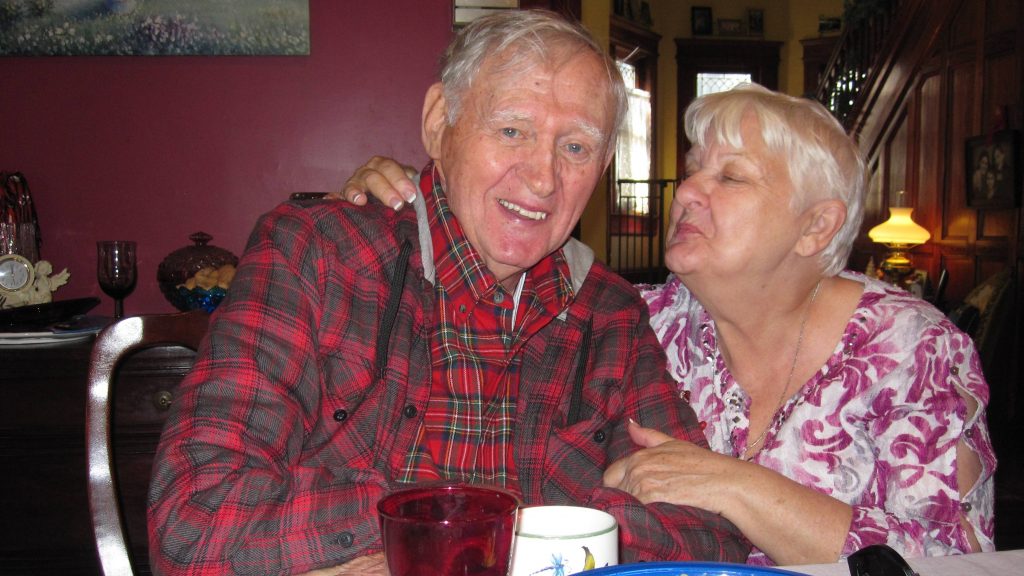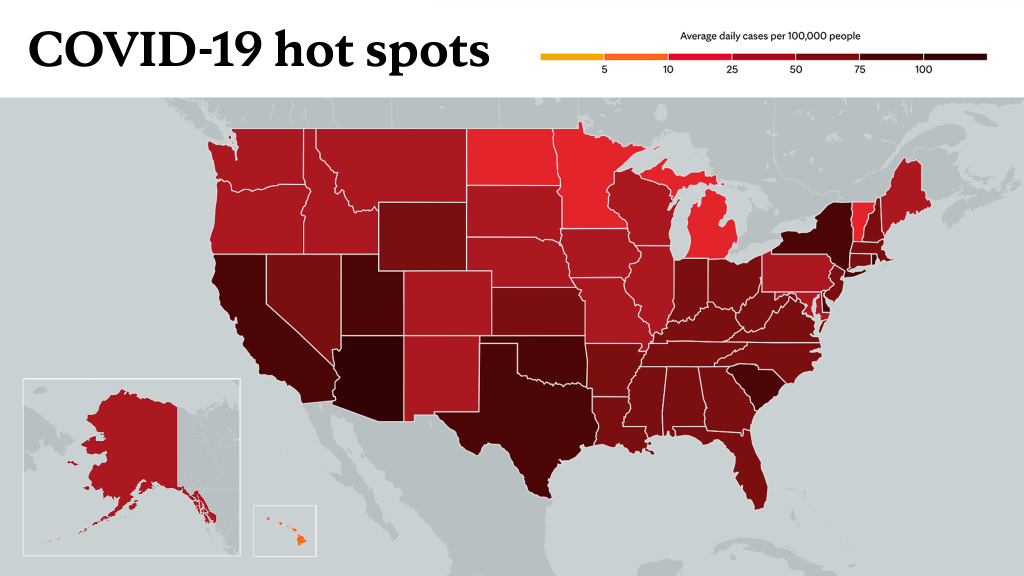-
COVID-19
Mayo Clinic Platform: A patient’s experience and beyond

While 2020 brought many challenges and disruptions, the Mayo Clinic Platform grew at an accelerated pace and contributed to the fight against COVID-19.
The platform, which was announced in 2019 as a way to transform health care through the use of artificial intelligence (AI), data analytics and connected care, has continued to evolve. Platform initiatives are growing support from patients around the globe who recognize the value of the innovations.
Consider the story of William Horne.
It was the Friday after Thanksgiving when William Horne began experiencing symptoms that prompted a call to 911. The 84-year-old Jacksonville Beach, Florida, resident was taken to Mayo Clinic, where he tested positive for COVID-19 and was admitted to Mayo Clinic Hospital in Florida. Two days later, doctors told him his wife Beverly Horne was in the Emergency Department. She, too, had COVID-19 and was admitted to the hospital.
Though neither was happy to be hospitalized, Bill says the staff and care were phenomenal. He also called out the new advanced care at home program from the Mayo Clinic Platform that allowed the couple to celebrate the holidays together in their own home.
"I've celebrated 83 Christmases, but I wasn't going to give up this one," says Bill, who was one of 102 Mayo patients to take advantage of the advanced care at home program in 2020. This program, which is offered at Mayo Clinic in Florida and Mayo Clinic Health System in Eau Claire, Wisconsin, allows hospitalized patients to be discharged early and finish recuperating at home.
"This program was amazing," says Bill, noting the constant communications via in-person visits, phone and a tablet. "Psychologically, it was wonderful because we could be together in our home and not the hospital."
The advanced care program was launched in mid-2020 as the need for virtual and remote care exploded. This program was launched in cooperation with Medically Home, a Boston-based company that uses a patient-centric model to provide high-acuity care to high-complexity patients.
The program seeks to provide care at home for patients who would otherwise be hospitalized for chronic diseases such as heart failure and COPD, infections such as pneumonia and cellulitis, and postsurgical hospitalizations. The opportunity to expand the program in support of COVID-19 patients directly supports Mayo Clinic's strategy to Cure, Connect and Transform.
"The platform was in the right place at the right time," says John Halamka, M.D., president, Mayo Clinic Platform. "COVID-19 has forced a level of focus and collaboration that the platform was designed for, enabling private and public-private collaborations."
In addition to the advanced care at home program, the virtual care component of the platform expanded further when Mayo Clinic recently announced the Safe Health Systems initiative. This initiative uses a propriety health and connected diagnostics platform ― Safe ― to improve access to efficient, affordable treatment for common medical conditions.
Providing a convenient and integrated patient experience for diagnostic testing, including COVID-19, is central to the Safe Health Systems initiative. A patient completes a phone-based questionnaire and immediately connects with a clinician who can order necessary tests. The test results appear on the patient's phone, and can be used as part of treatment, return to work or life planning.
Going beyond virtual care, other areas of innovation related to Mayo Clinic Platform include the Clinical Data Analytics Platform.
Clinical Data Analytics Platform
The Clinical Data Analytics Platform launched to improve patient health through insights and knowledge derived from clinical data. This platform took 154 years of Mayo Clinic data, including digital information, paper documents, pictures and recordings, deidentified it, and put it into a secure repository where physicians, researchers and others can use advanced AI tools to develop new knowledge based on the deidentified data.
While protecting patient data privacy, Mayo Clinic and its partners apply AI to biomedical data to develop new ways to diagnose, treat and cure patients. To ensure patient privacy in new environments, Mayo Clinic Platform experts have incorporated 11 layers of protection.
Mayo Clinic is working with nference, an AI company based in Cambridge, Massachusetts, that developed an initial algorithm to deidentify patient data, providing AI-ready data sources that can support drug discovery and clinical trials, and help patients, providers and payers.
Mayo Clinic's Department of Cardiovascular Medicine is using AI to determine the effects of COVID-19 on the heart in ways the human eye cannot. nference's analytic tool set — nferX — is being used to help researchers understand the disease's molecular signatures to detect better and treat COVID-19. Also, this tool set provides an understanding of viral shedding patterns in patients who are not hospitalized, how the disease spreads in communities and where critical resources are needed.
K Health Inc., a New York City-based medical services company, is using the Clinical Data Analytics Platform to inform algorithms. The collaboration with K Health focuses on improving and accelerating the deployment of virtual care models to improve patient care. This joint effort enables Mayo to extend its reach and transform medicine at a much faster pace than working alone.
What's ahead
A third area of focus for the platform team is remote diagnosis and management, which will use analytics to discover and trace problems, and data to resolve them. For example, the Mayo Clinic Platform will receive a signal from a device, interpret the data and send back a diagnosis or care recommendation.
"The hope is that as the work of the Mayo Clinic Platform goes forward, there becomes a societal expectation that care is coordinated, that patients are getting the best advice from the best experts, and that specialists are watching patient data as it's generated to make sure patients have the best opportunities for care," says Dr. Halamka.
_____________________________________
For the safety of its patients, staff and visitors, Mayo Clinic has strict masking policies in place. Anyone shown without a mask was either recorded prior to COVID-19 or recorded in a nonpatient care area where social distancing and other safety protocols were followed.
Information in this post was accurate at the time of its posting. Due to the fluid nature of the COVID-19 pandemic, scientific understanding, along with guidelines and recommendations, may have changed since the original publication date.
For more information and all your COVID-19 coverage, go to the Mayo Clinic News Network and mayoclinic.org.
Learn more about: Tracking COVID-19 and COVID-19 trends








